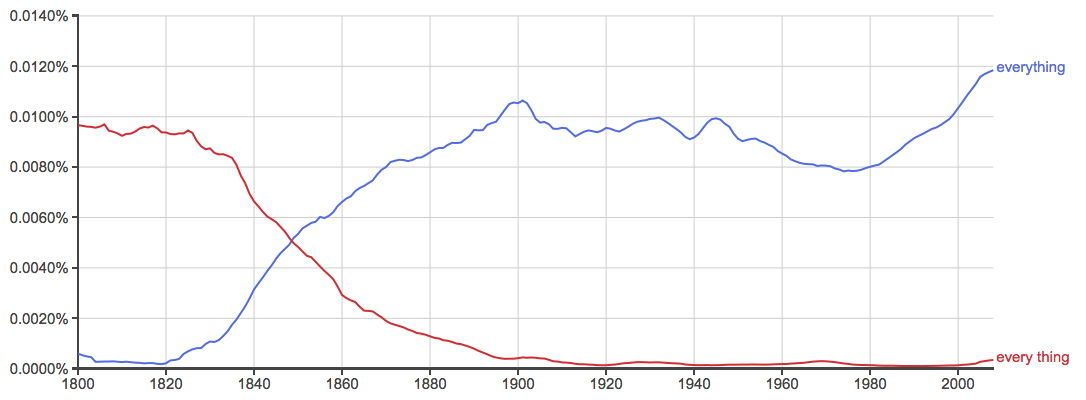Today, I want to talk about two different spellings of the same word: everything vs. every thing. Is there any difference between these two, other than a space?
Are they similar to everyone / every one, where there is a clear difference in meaning?
Let’s find out.
What is the Difference Between Everything and Every thing?
There doesn’t appear to be a major difference in meaning between these two spellings; the one-word everything is now the default and more common spelling.
It has been said that every thing suggests things as individual items or units, while everything suggests all items as a collective unit. I’ve tried to illustrate this with the following examples.
- Every thing on this menu is bad for you.
- Everything on this menu is bad for you.
If it’s still unclear how these could be different, try the following sentences.
- Every item on this menu is bad for you.
- All of the items on this menu are bad for you.
The difference is one of emphasis, one focuses on the individual items, the other focuses on all items as a unit.
That said, the one-word everything has become universal, as everything is rarely spelled as two words.

The above chart graphs every thing vs. everything in books over the past 200 years. Sometime in the middle of the 19th century, every thing began to be written as one word. This is consistent across American English and British English.
When to Use Everything
What does everything mean? Everything (one word) is the default spelling. It is defined as all things; all things of a group or class; all things of importance; the most important fact or consideration.
- Everything in this house will need to be replaced.
- It is the black hole of the Rangers lineup, and coach Alain Vigneault is doing everything he can to keep it from sucking away any semblance of a balanced forward group. –New York Post
- In business, location is everything.
When to Use Every thing
Is is now rare to see everything written as two words. There are some circumstances, however, that call for the two-word every thing, and that is when an additional adjective is placed in between both words.
- He corrects every little thing that you say.
- Every single thing she touches is a success.
This is common in speech but rarely seen in writing—especially formal writing of any kind.
Everything Uses Singular Verbs
 It’s important to note that while everything refers to all things in a group or class, it takes a singular verb.
It’s important to note that while everything refers to all things in a group or class, it takes a singular verb.
- The houses were damaged after the tornado, but everyone was all right. (Correct)
- The houses were damaged after the tornado, but everyone were all right. (Wrong)
In this example, everything refers to many different people, but it still takes the singular verb was, not were. For a discussion on was vs. see, see here.
Popular Phrases that Use Everything
Have Everything. This is another informal phrase that means to possess every attraction or advantage.
- She has a successful career, a loving husband, and two wonderful kids; she has everything.
Summary
Is it every thing or everything? There is little, if any, difference in meaning between the two.
Everything is now the default spelling, but is separated into two words when an adjective comes in the middle (every single thing).
Contents
